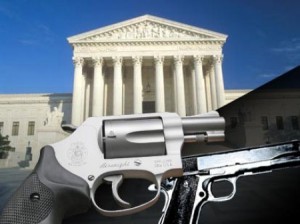Does the Second Amendment Protect a Right to Carry Guns Outside The Home?
In a move that provided a great excuse for authors of constitutional law textbooks to come out with a new edition (as if they needed one), the Supreme Court ruled a couple years ago that the Second Amendment to the Constitution confers an individual right to bear arms, ruling that laws which prohibit or severely restrict the possession of handguns in private residences are unconstitutional. Last year, the Supreme Court ruled that this right is incorporated against the states by the 14th Amendment, so the right applies nationwide (not just on federal property) and restricts state governments along with the federal government.
Both of those cases, however, left many, many questions unanswered. While the court in both cases gave a few guidelines on what types of restrictions on gun ownership and possession are constitutionally-permissible (for example, states can ban gun ownership by convicted felons, they can require background checks and registration, they can ban guns from government buildings, etc.). However, the court left many gaps which are presumably to be filled in subsequent cases, as the issues arise.
 The Supreme Court is now being given its first opportunity to answer one of the biggest unanswered questions it left in Heller and McDonald (the two cases mentioned earlier): does their ruling extend to the right to carry concealed weapons outside the home (in this case, in a car on a public highway)?
The Supreme Court is now being given its first opportunity to answer one of the biggest unanswered questions it left in Heller and McDonald (the two cases mentioned earlier): does their ruling extend to the right to carry concealed weapons outside the home (in this case, in a car on a public highway)?
Many states already allow residents to carry a concealed weapon, with varying restrictions. Some states, known as “shall-issue” jurisdictions, will grant a license to carry a concealed weapon to anybody who requests one, unless there is a compelling reason not to (they are a convicted felon, under the legal age of majority, etc.). Other states, known as “may-issue” jurisdictions, allow people to apply for concealed-carry licenses, but will only grant them if the applicant shows that they have a very good reason for needing to carry a gun with them.
And in a few states, like Arizona, you can legally carry a concealed firearm without even having to apply for a permit.
Quite a few states, however, do not issue concealed-carry permits, and have altogether banned the carrying of concealed weapons outside the home.
So far, lower courts have consistently ruled that the Second Amendment, when read along with the Supreme Court’s recent opinions, does not confer a right to carry concealed weapons outside the home. However, before McDonald and Heller, lower courts were ruling, pretty consistently, that the Second Amendment doesn’t confer an individual right to keep guns in the home, and the Supreme Court overruled them on that point.
So, if the Supreme Court ends up granting cert, there’s a real chance that it could further extend the protections afforded by the Second Amendment. While there are federal laws that are meant to make it easier for people to transport lawful, registered firearms across state lines without running afoul of state laws (known as “peaceable journey” laws), many states have laws on the books that place severe restrictions on carrying guns outside the home, even if they’re in the trunk of a car where neither the driver nor any passengers have immediate access to them.
While I’m not sure how the Supreme Court should rule in this case, if it even takes it, it does seem that if it did find a limited right to carry a gun in one’s car, establishing a constitutional baseline, it would make transporting guns (for lawful purposes) across state lines much easier, and create far less hassle and uncertainty for law-abiding gun owners.
On the other hand, there is no question that guns, in the wrong hands, are dangerous. And while both sides of the gun control debate can cite volumes of studies showing that increased gun ownership increases or decreases violent crime (proving that the issue of gun control is probably far more complicated than either side of the debate makes it out to be), there are obvious concerns raised by the recognition of a constitutional right to carry guns in automobiles on public highways.
We all know that “road rage” is a problem, and it’s not hard to imagine somebody snapping and firing shots at other motorists when they perceive that they’ve been slighted. Obviously, this would not be a common occurrence, but it’s hard to argue that more guns on the road wouldn’t make this more common.
Also, the presence of a gun, even if it’s legal, in a car could trigger a misunderstanding with a police officer, possibly leading to an officer-involved shooting.
On the other hand, I recognize that people have a right to defend themselves, and that this right is relevant outside the home, as well as inside. I don’t pretend to have a perfect solution to the question of gun control, and I don’t expect the Supreme Court to have it, either. However, I’ve argued before that having a clear rule is, in many ways, more important than what the rule says. Legal uncertainty and ambiguity can be more paralyzing than clear prohibitions on certain types of conduct.
For example, in the U.S., cars drive on the right side of the road. In many other countries, they drive on the left side. One arrangement is no better than the other. What’s important is that a rule exists in the first place, to prevent head-on collisions.
Similarly, having a uniform, nationwide rule on the carrying of guns in private autos would also be helpful, reducing legal confusion.


Comments